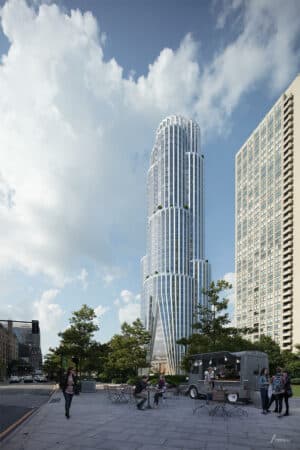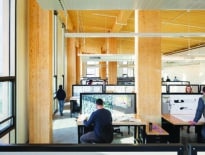
The Chiofaro Co.’s Pinnacle at Central Wharf is among the projects facing delays thanks to COVID-19 restrictions on community meetings. Image courtesy of Kohn Pederson Fox Assoc.
Massachusetts’ two-month-old ban on public gatherings upended a hidebound real estate development review process that included a steady dose of community forums and public hearings in overflowing meeting rooms.
As public agencies take a crash course in Zoom and other online platforms, a permanent shift toward virtual meetings could supplement, but not eliminate, the traditional city hall forum.
“The virtual aspects are probably here to stay,” said Rob Caridad, project manager for Boston-based Chiofaro Co. on the proposed $1.2 billion Pinnacle at Central Wharf skyscraper. “In a lot of the towns that have gone virtual, public participation has increased. Folks who have not attended a live meeting will find a way to tune in when they have a virtual option.”
The switch to a hybrid model could address some of the longstanding critiques of how communities gather feedback on development. The traditional evening public hearing excludes those who work nights and skews toward a handful of activists, critics say, while virtual meetings are inaccessible to less tech-savvy residents and those without robust internet service.
“We’ve found Zoom can allow people to be heard and the proponent to make a presentation,” which is good,” said Thomas O’Brien, managing director of Boston-based HYM Investment Group. “It’s not ideal, but in the world we’re in now, we’re adjusting to the new realities.”
While Boston Planning & Development Agency staff continue to review projects, the public review process for both Article 80 large development projects and planning studies is on hold.
Data at Different Times, Different Ways
Before the onset of the global pandemic, tech startups such as Boston-based coUrbanize laid the groundwork for a new way of distributing details of projects and letting the public sound off.
Co-founded in 2013 by Karin Brandt, the firm counts both developers and public agencies as clients. Developers post presentations and project timelines, residents can sign up for email and text alerts for updates, and online forums encourage public comment.
After the onset of COVID-19, coUrbanize added new features for virtual meetings, online chat sessions and a voicemail comment transcription service.
“Public meetings have never been perfect or equitable or inclusive, and with the move to virtual meetings, that has been exacerbated,” Brandt said. “We get questions about how we can represent more vulnerable populations, and people who don’t have the technology or time to show up on another Zoom call at 7 p.m. on a Tuesday. We’re focusing on delivering more ways people can access information at different times and different ways.”

After a two-month hiatus on reviews of major projects, the Boston Planning & Development Agency is studying how to restart its project reviews while maintaining COVID-19 era protocols.
The Cambridge Redevelopment Authority is using the coUrbanize platform as part of its review of a proposed rezoning of Boston Properties’ Blue Garage property in Kendall Square to add two 400,000-square-foot office-lab buildings.
“We think it’s a good portal and we would have done it with or without [the COVID-19 crisis],” CRA Executive Director Tom Evans said. “Certainly, the need to try out another means of communicating with the public and getting feedback on projects is vital.”
Industry Awaits BPDA Moves
Massachusetts communities have responded to the COVID-19 crisis with a variety of workarounds. Some agencies have continued to review and vote on development projects using virtual meeting platforms, while others temporarily placed decision-making on hold.
The BPDA halted formal reviews on large projects and meetings on its various planning studies in March, and approved one project at its first virtual meeting in May, conversion of the former Ames Hotel into a Suffolk University undergraduate dorm. The agency is still working out details of a permanent COVID-19–era approach, spokeswoman Molly McGlynn said. In the meantime, it’s expanding its virtual meeting scope, scheduling a pair of online “Chat with a Planner” sessions on June 3 and 5 focusing on the Mattapan and Newmarket neighborhoods.
The agency appears to be leaning toward a hybrid strategy including both in-person meetings and virtual platforms that allow public comment, Chiofaro Cos.’ Caridad said.
One lingering obstacle will be maintaining social distancing at BPDA meetings, whether board of directors’ meetings in the agency’s ninth-floor City Hall hearing room, or smaller neighborhood venues.
“They’re trying to figure out how to balance the challenges of in-person meetings versus the limitations of virtual meetings,” Caridad said.
What Comes Next?
Approval of the recent building boom’s largest project yet, HYM’s 16.5 million-square-foot Suffolk Downs redevelopment, has been delayed by community demands for a bigger affordable housing component as well as the health emergency.
HYM’s O’Brien said he prefers the format of presenting at large public meetings but has been satisfied with the potential use of online platforms.

Steve Adams
“The feedback I’ve gotten from people was that the process was well-received, and that probably ends up being the process for another few weeks at least,” O’Brien said. “Then the question becomes: What comes next? Do people hold meetings and maintain social distancing?”
In the suburbs, many communities have added electronic filing capabilities for developers that want to kick off permitting in a timely fashion, said Brian Falk, a land use attorney at Mirick O’Connell. Some developers have had to amend purchase-and-sale agreements that have permitting contingencies, to reflect the longer review period in communities that have suspended normal meeting schedules.
“This crisis is unprecedented, so they’re amending the agreements, so the money doesn’t go hard and the contingencies don’t expire,” Falk said.






